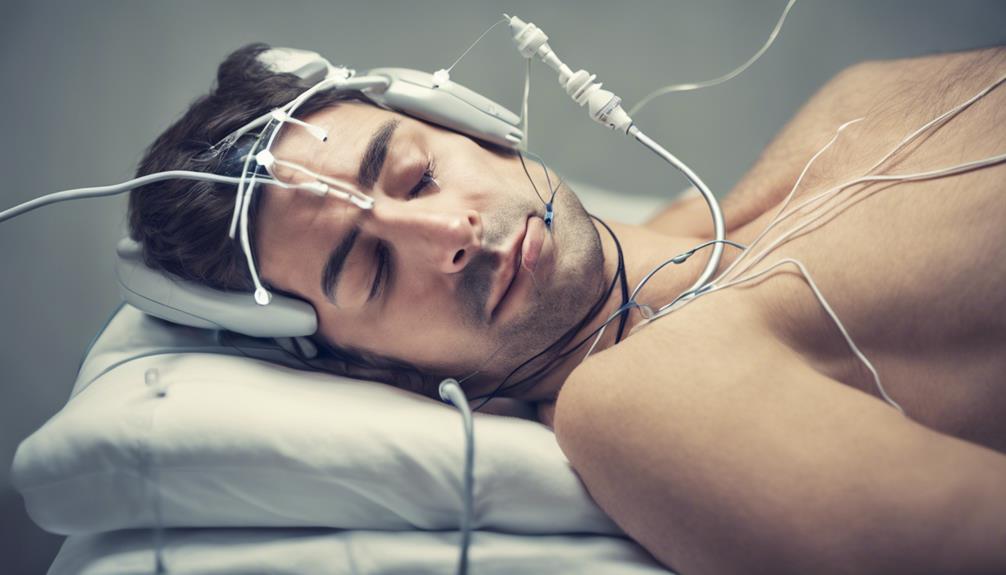Clinical trials on hypnosis for insomnia are vital for verifying its efficacy in enhancing sleep quality and addressing psychological aspects of insomnia. Rigorous research methods ensure reliable results through participant recruitment and data analysis. These trials measure the impact of hypnosis on sleep architecture and cognitive function, essential in assessing intervention effectiveness. Hypnosis within integrative medicine offers a holistic approach to managing insomnia, complimenting conventional treatments. Patients benefit from improved sleep patterns, reduced daytime fatigue, and enhanced well-being as results indicate positive outcomes. Further insights into the significance of hypnosis in treating insomnia can be discovered within the research.
Hypnosis as Insomnia Treatment

Hypnosis has been increasingly recognized as a viable and effective treatment for insomnia, with studies indicating its potential in improving sleep quality and addressing underlying psychological factors contributing to sleep disturbances. As a part of alternative therapies, hypnosis focuses on altering an individual's cognitive behavior towards sleep, aiming to promote relaxation and alleviate insomnia symptoms.
In the context of cognitive behavior, hypnosis for insomnia works by targeting and modifying negative thought patterns and beliefs that may be hindering a person's ability to fall and stay asleep. By guiding individuals into a deeply relaxed state, hypnosis aims to enhance their receptivity to suggestions that promote better sleep habits and attitudes towards bedtime.
Research suggests that hypnosis can complement traditional treatments for insomnia, offering a holistic approach that addresses both the physiological and psychological aspects of sleep disturbances. Through its focus on cognitive behavior, hypnosis provides a promising avenue for individuals seeking non-pharmacological interventions to improve their sleep quality and overall well-being.
Scientific Validation Through Trials
Various clinical trials have been conducted to scientifically validate the efficacy of hypnosis as a treatment for insomnia. These trials typically employ rigorous research methods to ensure the reliability and validity of the results.
Participant recruitment is a critical aspect of these trials, with researchers often looking for individuals who meet specific criteria related to their insomnia symptoms.
In these trials, data analysis plays a crucial role in determining the effectiveness of hypnosis as a treatment for insomnia. Researchers use various outcome measures, such as sleep onset latency, total sleep time, and sleep efficiency, to assess the impact of hypnosis on improving sleep quality and quantity in participants with insomnia.
Understanding Efficacy in Sleep Disorders

The assessment of efficacy in managing sleep disorders requires a comprehensive understanding of the underlying mechanisms and treatment modalities. Sleep quality is a crucial aspect to consider when evaluating interventions for sleep disorders. Improving sleep quality involves not only the quantity of sleep but also its depth and restorative properties. Efficacious treatments should aim to enhance overall sleep architecture, leading to more restful and rejuvenating sleep.
Furthermore, cognitive function plays a vital role in assessing the efficacy of interventions for sleep disorders. Sleep disturbances can significantly impact cognitive performance, including attention, memory, and decision-making abilities. Therefore, effective treatments should not only focus on improving sleep but also on enhancing cognitive function.
Evaluating changes in cognitive function following treatment can provide valuable insights into the effectiveness of interventions for sleep disorders.
Role in Integrative Medicine Practices
One prevalent trend in contemporary healthcare involves incorporating complementary and alternative therapies into traditional medical practices to optimize patient outcomes and well-being. Hypnosis for insomnia plays a significant role in integrative medicine practices by offering a holistic approach to addressing sleep disorders. Integrative medicine emphasizes treating the whole person, taking into account physical, emotional, mental, social, and spiritual well-being.
Hypnosis is considered an alternative therapy that can complement conventional treatments for insomnia. By tapping into the power of the mind, hypnosis can help individuals relax, reduce stress, and improve sleep quality naturally. This non-invasive technique is gaining recognition for its effectiveness in promoting better sleep patterns without the need for medication.
Integrating hypnosis into a comprehensive treatment plan for insomnia aligns with the principles of integrative medicine, focusing on personalized care and addressing the root causes of sleep disturbances. By incorporating hypnosis as an alternative therapy, healthcare providers can offer patients a more holistic approach to managing their insomnia, ultimately improving overall well-being.
Impact on Patient Well-being

Research studies have consistently shown that hypnosis for insomnia has a positive impact on patient well-being by promoting better sleep quality and overall health outcomes.
Patients experiencing insomnia often suffer from a reduced quality of life due to the detrimental effects of sleep deprivation on physical and mental health. Hypnosis as a therapeutic intervention has demonstrated effectiveness in improving sleep patterns, leading to enhanced patient outcomes and an overall better quality of life.
Clinical trials focusing on hypnosis for insomnia have revealed significant improvements in various patient-reported outcomes, including increased sleep duration, decreased sleep latency, and enhanced sleep efficiency. These improvements not only address the primary symptoms of insomnia but also have a ripple effect on other aspects of well-being, such as reduced daytime fatigue, improved mood, and enhanced cognitive function.
Future Implications and Research Opportunities
Moving forward, exploring the potential future implications and research opportunities in the realm of hypnosis for insomnia presents an avenue for advancing the understanding and application of this therapeutic approach in clinical practice.
Conducting further research into hypnosis for insomnia could unveil a myriad of potential benefits. This includes enhancing the effectiveness of hypnotherapeutic interventions, identifying subgroups of patients who may respond better to hypnosis, and elucidating the mechanisms through which hypnosis exerts its effects on sleep quality and duration.
Moreover, delving into new avenues of research could lead to the development of innovative hypnosis techniques tailored specifically for insomnia treatment. By investigating the long-term effects of hypnosis on sleep patterns and exploring its synergistic potential with other therapeutic modalities, such as cognitive-behavioral therapy, researchers can pave the way for more comprehensive and integrated approaches to managing insomnia.
Frequently Asked Questions
How Do Researchers Ensure Hypnosis Is Safe for Insomnia Treatment?
Researchers ensure hypnosis is safe for treating insomnia by implementing rigorous safety measures and research protocols. They assess potential risks thoroughly, prioritize participant well-being, and adhere to ethical guidelines to safeguard the integrity of the study.
Can Hypnosis Be Used as a Standalone Therapy for Severe Insomnia?
Hypnosis, as an alternative therapy, shows promise as a standalone treatment for severe insomnia. Clinical trials indicate effectiveness in improving sleep quality. Patient experiences suggest long-term benefits, highlighting the potential role of hypnosis in managing sleep disorders.
Are There Specific Guidelines for Hypnosis Sessions in Clinical Trials?
In clinical trials involving hypnosis for insomnia, adherence to established hypnosis standards is crucial to ensure patient safety. Guidelines should address therapist qualifications, session protocols, informed consent, and monitoring adverse effects to uphold ethical and effective practices.
What Factors Influence the Success of Hypnosis in Treating Insomnia?
Various factors influence the success of hypnosis in treating insomnia, including the skill of the therapist in employing hypnotic techniques, the patient's receptiveness, and their expectation of treatment efficacy. These components play a vital role in treatment outcomes.
Is Hypnosis for Insomnia Covered by Health Insurance?
Insurance coverage for hypnosis for insomnia varies, with many plans offering limited or no coverage. This can impact patient accessibility and affordability, making it essential to carefully review policy details and consider alternative payment options for treatment.
Conclusion
In conclusion, clinical trials on hypnosis for insomnia play a crucial role in providing scientific validation for its efficacy as a treatment option.
By understanding the impact of hypnosis on sleep disorders and its role in integrative medicine practices, researchers can further explore its potential benefits for patient well-being.
Future research opportunities in this area hold promise for advancing the field of sleep medicine and improving outcomes for individuals suffering from insomnia.


